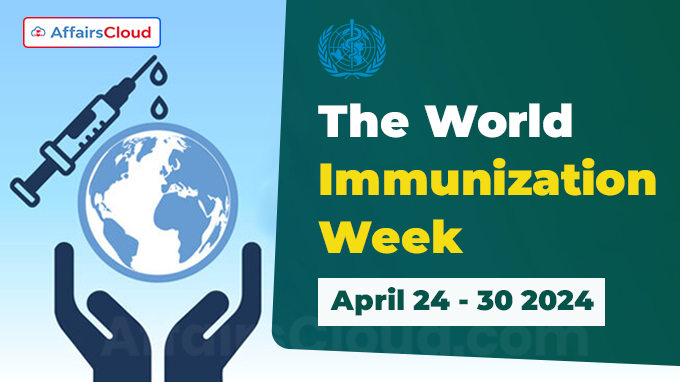
- World Immunization Week 2024 was observed from 24 to 30 April 2024.
- WIW 2024 commemorates the 50th anniversary of the World Health Organization’s (WHO) Essential Programme on Immunization (EPI).
The annual observance of WIW is led by WHO to encourage vaccination to prevent potential illness in people of all ages.
Theme:
The theme of World Immunization Week 2024 is “Humanly Possible: Immunization for All”.
- The 2024 theme highlights the significance of immunization and its contribution in eradicating smallpox, nearly eliminate polio, and ensure more children survive than ever.
Campaign:
WHO, the United Nations Children’s Fund (UNICEF), Gavi (the Vaccine Alliance), and the Bill & Melinda Gates Foundation (BMGF) unveiled the “Humanly Possible”, a joint campaign, marking the annual WIW 2024.
“Humanly Possible” campaign theme emphasises the goal of providing universal access to lifesaving vaccines for children worldwide.
Background:
i.Immunization Week initiatives began in the Region of the Americas in 2003.
ii.The Week was observed simultaneously in WHO’s 6 regions for the 1st time in 2012, with the participation of more than 180 countries, territories, and areas.
iii.In May 2012, the 65th World Health Assembly (WHA) adopted the resolution WHA65.18 requesting the Member States to designate the last week of April, as the World Immunization Week.
Objective:
The primary aim of WIW is to ensure that more children, adults, and communities are shielded from such diseases, thus enabling them to lead happier, healthier lives.
Note: The 2024 observance recognises efforts to combat vaccine-preventable diseases and urges increased investment in immunization programs.
EPI’s Evolution:
i.Established in 1974 by the World Health Assembly (WHA), EPI aimed to vaccinate all children against several diseases, including smallpox.
ii.The program, now known as the Essential Programme on Immunization, includes:
- Universal recommendations to vaccinate against 13 diseases; and
- Context-specific recommendations for another 17 diseases.
iii.From its inception targeting children, EPI now encompasses recommendations for adolescents and adults, extending its reach.
Global Impact:
i.Initially, only 5% of infants had access to routine immunization; Today, 84% receive 3 doses of diphtheria, tetanus, and pertussis (DTP) vaccine.
ii.Measles vaccines alone have saved nearly 94 million lives since 1974, yet millions still miss out on crucial doses.
Challenges and Solutions:
i.Achieving 95% coverage with measles-containing vaccines remains crucial to prevent outbreaks, with current global rates at 83% for the 1st dose and 74% for the 2nd.
ii.Organizations like UNICEF and Gavi procure and distribute vaccines globally, ensuring even remote communities receive immunization services.
2024 Events:
To mark the WIW 2024, the Federal Ministry of Health (Somalia), WHO, and UNICEF have jointly urged partners and donors to accelerate immunization efforts to reach every child in Somalia.